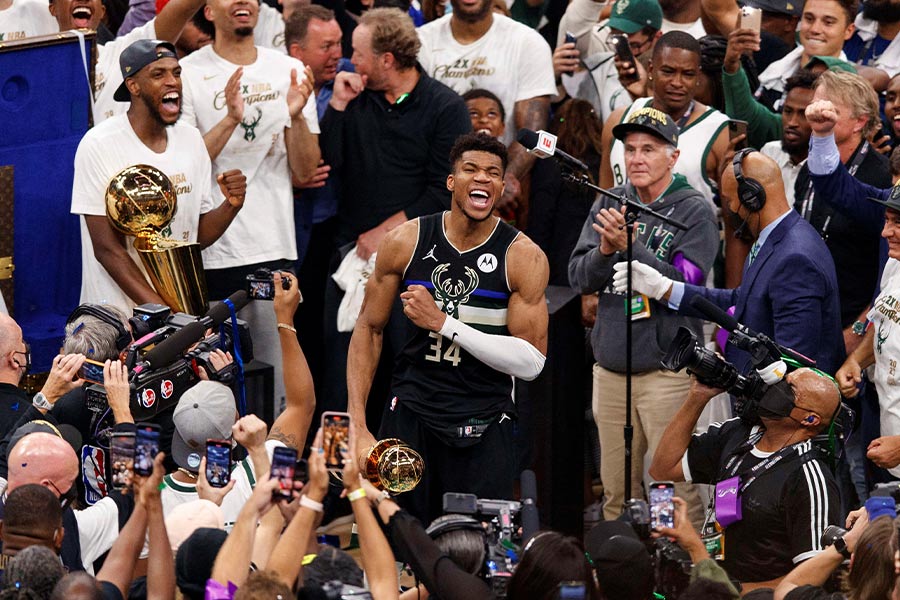More than a championship

Milwaukee Bucks forward Giannis Antetokounmpo celebrates with the NBA Finals MVP Trophy in Milwaukee July 20, 2021, following game six of the 2021 NBA Finals the game against the Phoenix Suns. Antetokounmpo led the tam to its first championship since 1971. (CNS photo/Jeff Hanisch, USA TODAY Sports via Reuters)
All of Wisconsin cheered for the Milwaukee Bucks July 20 as they captured their first NBA title in 50 years, defeating the Phoenix Suns, 105-98. Their star player, Giannis Antetokounmpo, scored 50 points and was named the NBA Finals' Most Valuable Player.
In many ways, Antetokounmpo's ascent as one of professional sports' brightest stars follows a blueprint for the American dream. Hard work, determination and perseverance helped Giannis transition from a child of poor Nigerian immigrants living in Greece to a world-famous athlete.
Following the Bucks' victory, Giannis spoke to reporters and gave credit to his parents for their sacrifices in the face of so many obstacles.
"I started playing basketball just to help my family. I tried to get them out of the struggle, the challenges we were facing when we were kids," he said. "How much my parents sacrificed — I saw that every day. Every day of my life I saw that. This is for my mom. She worked extremely hard for me to be in this position. This is for my dad, and he's watching from above... People helped me to be in this position. I didn't do it alone."
Basketball fans, both casual and hard core, know Antetokounmpo by the moniker, "the Greek Freak," a reference to his seemingly superhuman athleticism. Yet many fans may not know the struggles he faced growing up in Greece — struggles that Catholic relief agencies such as Caritas Internationalis and their U.S. affiliates, Catholic Relief Services and Catholic Charities USA, see every day as they work with immigrants and refugees around the world.
Antetokounmpo's parents, Charles and Veronica, immigrated to Greece from Lagos, Nigeria, in 1991 to escape poverty and find a better life for their family. Giannis was born in Athens in 1994. As a child, he sold CDs, DVDs and sunglasses on the streets of Athens to support his family, according to The New York Times.
Their status as illegal immigrants made the threat of deportation a constant fear. There also was a strong anti-immigrant climate in Greece. Members of a neo-Nazi political party known as Golden Dawn, which rose to power following the 2007-2008 economic crisis in Greece, were randomly assaulting immigrants.
Thanks to their physical attributes, Giannis and his three brothers found basketball as a way out of poverty. By age 13, Giannis had caught the eye of scouts in the Greek amateur basketball leagues. Five years later, he was selected as the 15th pick in the NBA draft by the Milwaukee Bucks.
Not every refugee is able to break free from the chains of oppression, poverty and violence. Amnesty International estimates that 26 million people around the world, half of them children, are refugees today.
For every Giannis Antetokounmpo, there are countless others who remain refugees without a home. In 2019, only 0.5% of the world's refugees were resettled, according to Amnesty International. Yet for many of them, a glimmer of hope flashed from Fiserv Forum and the Deer District in Milwaukee the evening of July 20.
"I hope I give people around the world, from Africa, from Europe, hope that it can be done," Antetokounmpo said. "Eight and one-half years ago, I didn't know where my next meal would come from. My mom was selling stuff in the street. Now I'm here sitting at the top and I'm extremely blessed. I hope that this can give everybody around the world hope."
Sports have a way of uniting people from different backgrounds, regardless of age, race, religion or political persuasion. May all of us who cheered for the Bucks and Antetokounmpo be more sympathetic to the plight of other refugees who want nothing more than an opportunity to make their own mark on the world.
By Sam Lucero, Catholic News Service
